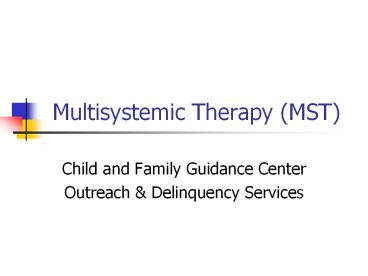Multisystemic Therapy (MST) - PowerPoint PPT Presentation
1 / 11
Title:
Multisystemic Therapy (MST)
Description:
Evidence-based: MST is a well-validated treatment model (Kazdin & Weisz, 1998) ... Therapists carry a caseload of 4-6 families at a time. ... – PowerPoint PPT presentation
Number of Views:275
Avg rating:3.0/5.0
Title: Multisystemic Therapy (MST)
1
Multisystemic Therapy (MST)
- Child and Family Guidance Center
- Outreach Delinquency Services
2
What is MST?
- An intensive family and community-based treatment
program that serves serious juvenile offenders
and their families. - Uses a systemic approach, addressing multiple
factors known to be related to delinquency within
the family, peer, school neighborhood, other
support systems. - Uses the strengths of each system to promote
behavior change.
3
The Ultimate Goals of MST
- To empower parents and caregivers with the skills
and resources needed to independently address the
difficulties their children are having. - To empower youth to cope with family, peer,
school, and neighborhood problems without
engaging in delinquent behaviors or substance
abuse. - To assist families in improving their overall
communication and functioning.
4
How is MST Different?
- Evidence-based MST is a well-validated
treatment model (Kazdin Weisz, 1998). Studies
with violent and chronic juvenile offenders
showed that MST reduced long-term rates of
re-arrest by 25 to 70 in comparison with
control groups. - Short Term MST treatment lasts between 3 and 6
months. - Community-based Treatment is provided in home
and community settings. - Intensive MST therapists have multiple
face-to-face and telephone contacts each week.
MST therapists are available to families 24 hours
a day, seven days a week.
5
MST Interventions
- MST interventions typically aim to
- Improve caregiver monitoring and discipline
practices. - Enhance family relationships and overall
functioning. - Decrease the youths association with negative
peers. - Increase the youths association with prosocial
peers. - Improve the youths school and/or vocational
performance. - Engage the youth in prosocial activties.
- Develop an indigenous support network of extended
family, neighbors, and friends to help caregivers
achieve and maintain changes.
6
MST Referral Criteria
- An adolescent between the ages of 12 and 17 years
of age. - Classified as WIC 602 or 790 (felony) status
minor. - Attends an MST designated school site.
- Exhibits negative and externalizing behaviors
that may include poor school performance, poor
peer relationships, truancy, substance abuse,
runaway from home, firesetting, disobedience,
stealing, aggression, and other antisocial
behaviors. - At risk of recidivism or placement in a more
restrictive living situation.
7
Types of MST Services and Interventions
- Individual and family therapy
- Substance abuse counseling
- Case management and referrals
- Advocacy
- Assistance with a child or family members
problems at home, school, or in the community - Crisis Intervention
- Parenting Training and education
8
MST School Sites
- Chatsworth High School
- Cleveland High School
- Mid Valley CEC
- Mission Continuation
- Monroe High School
- Polytechnic High School
- Reseda High School
- San Fernando High School
- San Fernando Middle School
- Sepulveda Middle School
- Sun Valley Middle School
9
MST Program Staff
- Jennifer Maldonado, LCSW, MST Supervisor
- Jamie Bunch-Sanfilippo, MA, MST Therapist
- Juan Macias, MSW, MST Therapist
- Nate Lloyd, MS, MST Therapist
10
Program Data
- CFGCs MST program was first implemented in
October 2001, as part of a pilot program
collaboration with the Los Angeles County
Department of Mental Health and Department of
Probation. - MST is funded through the Board of Corrections
with the use of Schiff-Cardenas and STOP funds. - Total number of cases served in MST since October
2001. - Data is still being collected on the overall
success rate of families in MST however
preliminary data indicates that youth discharged
from MST have lowered re-arrest rates and
improved school and vocational functioning. For
example, the percentage of youth with no
re-arrests is 91.43 and the percentage of youth
in school and/or working is 68.57.
11
Program Specifics
- Current staffing includes one MST-trained
supervisor and 3 full-time MST therapists. - Therapists carry a caseload of 4-6 families at a
time. - Services are provided in English and Spanish.
- Therapists and supervisor are available 24 hours
a day, seven days a week. - In addition to having multiple contacts with
families, therapists collaborate on a regular
basis with probation officers, school staff, and
prosocial activity providers. - The MST team meets for weekly telephone
conferences with a consultant from MST Services,
Inc., based in Charleston, SC. - Therapists adherence to the MST model is
evaluated by monthly questionnaires that are
completed via phone with families. Supervisors
are evaluated by therapists on a quarterly basis. - The MST team attends quarterly MST booster
trainings with the MST consultant.































